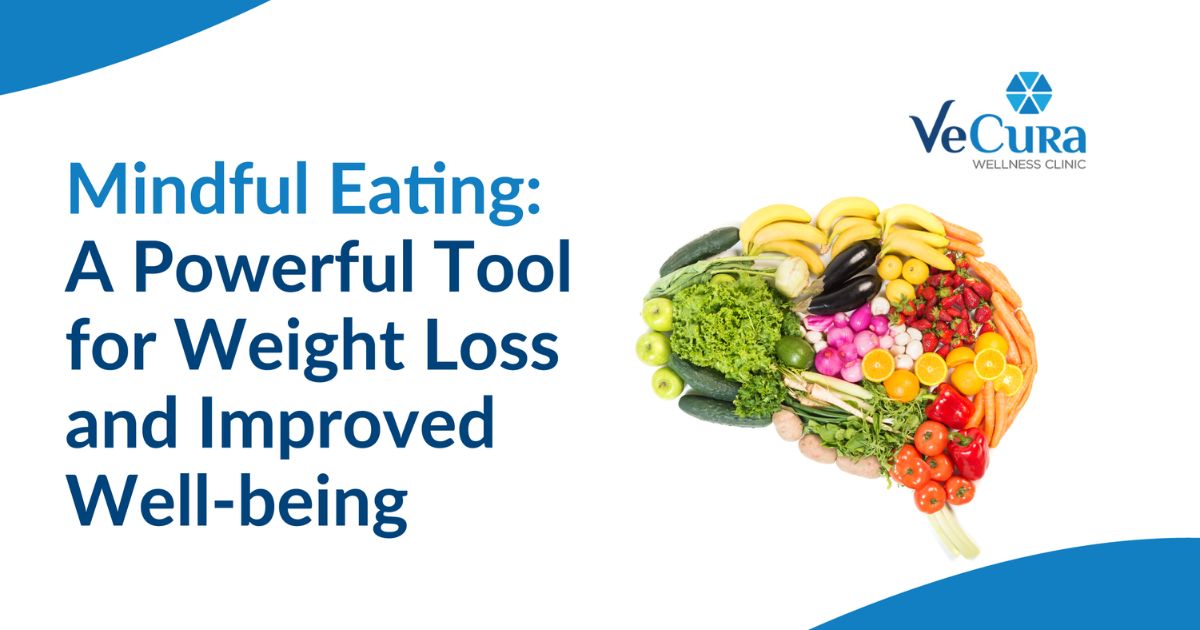If you’ve ever been advised to eat your food without watching TV or scrolling through social media, you should know that even science endorses this advice.
Mindful eating, a practice rooted in ancient traditions, has gained significant recognition in recent years as a powerful tool for weight loss and improved well-being. It goes beyond simply what we eat and focuses on how we eat, emphasising awareness and presence during meals.
By cultivating a deeper connection with our bodies and the food we consume, mindful eating offers a holistic approach to nourishment that can transform our relationship with food, promote healthier choices, and bring about a profound impact on both our physical and mental well-being.
In this blog, we will explore the principles and benefits of mindful eating and how it can positively impact weight loss efforts.
What’s Our Relationship With Food?
Our relationship with food goes far beyond just nutrition. It is the result of a complex interaction of emotions, habits, and cultural factors. Food can be a source of comfort, joy, or even stress.
Understanding and evaluating our relationship with food is an important first step towards mindful eating. It involves looking into our food-related attitudes, beliefs, and behaviours, as well as detecting any problematic patterns or emotional attachments we may have created.
By becoming aware of our individual relationship with food, we can better navigate the choices we make and cultivate a more balanced and nourishing approach to eating.
What is Mindful Eating?
Mindful eating is a practise that involves paying attention to the present moment while eating. It addresses the complete experience of eating, including the senses, emotions, and thoughts related to food.
By cultivating awareness and non-judgmental acceptance, mindful eating encourages individuals to tune into their body’s hunger and fullness cues, savour each bite, and eat with intention.
It involves slowing down, chewing thoroughly, and relishing the flavours and textures of the food. Mindful eating creates a healthier connection with food, increases self-awareness, and allows individuals to make mindful decisions that benefit their overall well-being.
5 Benefits of Mindful Eating
By embracing the practice of mindful eating, we can unlock the below benefits and experience a profound positive transformation in our overall health and well-being.
1. Weight Management
Individuals can avoid overeating and make mindful choices about portion sizes by paying attention to their bodies’ hunger and fullness cues. This mindful eating method encourages slower and more deliberate consumption, resulting in better satisfaction and fewer cravings.
2. Improved Digestion
Mindful eating improves digestion by allowing the body to process and absorb nutrients properly. We chew our food completely when we eat consciously, which helps in the breakdown of food particles and facilitates nutrient absorption.
By focusing on the act of eating, we also reduce stress levels, which can have a positive impact on digestive health.
3. Enhanced Awareness of Food Choices
Mindful eating promotes a greater awareness of the nutritional content and quality of our food. By being fully present during meals, we become more sensitive to the flavours, textures, and sensations of each bite.
This understanding allows us to make more informed dietary choices, prioritising nutrition and opting for better options.
4. Emotional Well-Being
Mindful eating helps us to view food as a source of nourishment rather than emotional comfort, resulting in a healthier connection with both food and our emotions.
It strengthens the bond between our brains and bodies, helping us to identify emotional triggers associated with food. We can better control emotional eating patterns by adopting a non-judgmental and compassionate approach towards our eating habits.
5. Increased Mindfulness in Everyday Life
Practicing mindful eating extends beyond mealtimes and permeates into other areas of our lives. By cultivating mindfulness during meals, we develop the ability to be more present and attentive in various activities.
This carries over to our interactions, work, and self-care routines, enhancing overall mindfulness and well-being. Mindful eating serves as a gateway to living a more conscious and intentional life.
How To Practice Mindful Eating?
Practising mindful eating is a simple yet profound way to bring conscious awareness to our eating habits and foster a healthier relationship with food.
We have listed some practical steps to incorporate mindful eating into your daily life.
- Slow down: Take your time eating your meals and eat them in a relaxed and relaxed manner. Chew each bite carefully to enjoy the food’s flavour and textures.
- Remove distractions: Remove distractions like television, smartphones, and other electrical gadgets to create a mindful eating atmosphere. Concentrate completely on the act of eating and engage all of your senses in it.
- Listen to your body: Pay attention to your body’s hunger and fullness signs. Eat when you’re physically hungry, and quit when you feel satisfied. Avoid idle munching or eating to pass the time.
- Engage your senses: Take note of the scent, taste, and texture of the dish. Pay attention to the colour and shapes on your plate. Fully immerse yourself in the present moment and enjoy the experience of eating.
- Practice gratitude: Take a moment to express gratitude for the nourishment offered by food. Develop a sense of gratitude for the farmers, producers, and everyone else involved in getting the food to your table.
You should understand that mindful eating is a journey and that it takes time and practice to develop the habit.
By incorporating these mindful eating techniques into your daily routine, you can cultivate a deeper connection with your food, make more informed choices, and enhance your overall well-being.
Approach VeCura Wellness For a Healthy Weight Loss!
VeCura Wellness is the best weight loss clinic for effective and long-lasting results,
1. Chennai
- T Nagar
- Anna Nagar
- OMR
- Porur
2. Trichy
3. Coimbatore
4. Salem
5. Madurai
6. Erode
7. Vellore
8. Hyderabad
- Malakpet
- Jubilee Hills
- A.S.Rao Nagar
9. Andhra Pradesh
- Vijayawada
- Visakhapatnam
- Tirupati
10. Telangana
- Medipally
- Kukatpally
11. Pondicherry
VeCura is trusted by millions for services offered like weight loss, inch loss, and body contouring. The Premier Plus Weight Loss program by VeCura Wellness—a reliable and effortless solution for shedding those extra kilos is effective. Our program incorporates a range of treatments that effectively boost metabolism, facilitate calorie burn, and help in body toning.
With our team of experienced wellness specialists, you’ll receive personalised guidance throughout the entire process. And the best part? The certified nutritionists and dieticians at VeCura Wellness provide a customised diet plan for your weight loss goals and lifestyle choices.
Conclusion
In conclusion, mindful eating holds tremendous potential as a powerful tool for weight loss and improved well-being. We can create a transformative shift in our relationship with food by shifting our focus from mindless consumption to being conscious of our meals.
This practice offers a holistic approach that extends beyond weight loss, impacting our mental and emotional well-being as well. By embracing mindful eating, we empower ourselves to make healthier choices and embark on a journey towards optimal health and overall wellness.
Note: To explore more engaging content and stay connected, feel free to visit VeCura Wellness YouTube channel for exciting videos, insightful discussions, and much more.
Mindful Eating: Frequently Asked Questions (FAQs)
1. How can mindful eating be used for weight loss?
Mindful eating reduces emotional and external eating, making it beneficial for weight management. To avoid overeating and promote increased awareness of your food choices, it may also help you learn to differentiate between actual and emotional hunger.
2. What are the 3 benefits of mindful eating?
By paying attention to the foods you consume, you can improve your digestion, eat less feel fuller for longer, and make more informed food decisions in the future.
3. What is the goal of mindful eating?
The goal of mindful eating is to encourage people to fully engage in the eating experience and help them savour the moment and the food.
4. What is an example of mindful eating?
While mindful eating consists of multiple habits and practices, one example of it is to chew and eat the food slowly, fully savouring it.
5. Does mindful eating reduce stress?
Yes, you can reduce anxiety and stress by eating mindfully. You should slow down and take a break from the daily grind during your meals as it helps in clearing your mind.










0 Comments